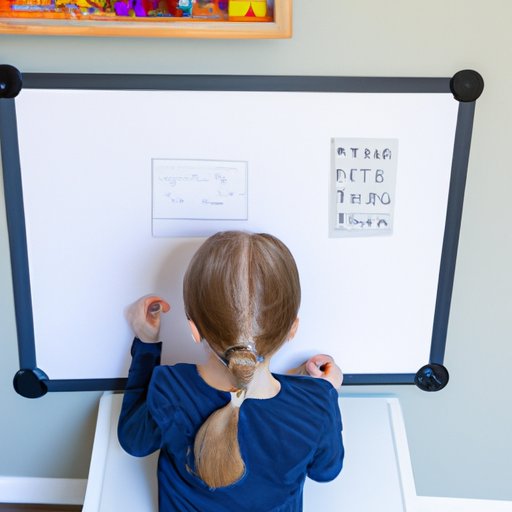I. Introduction
If you’re passionate about children and want to earn an income without leaving your home, setting up a home day care could be the way to go. However, there are several requirements to meet before opening a reputable business. In this article, you will learn about the critical steps, personal experiences, benefits of home care, regulations, and checklist of items you need to run a successful home day care center.
II. Step-by-Step Guide
A. Overview of Requirements
Running a successful home day care center is more than just throwing a few toys and games into a room and watching over the children. There are several key items you’ll need to create a safe and engaging environment for children of different ages. Some of the requirements include, but are not limited to, a license to operate, business insurance policy, first aid training, and completion of a criminal background check.
B. Checklist of Necessary Items
When it comes to creating a successful home Day care Center, there are key items to consider such as sleeping arrangements, toys, feeding supplies, and other essential equipment. For example, a crib, high chairs, playmats, toys and games, and baby bottles are necessary items to provide a secure and comfortable environment for kids.
C. Outline of Steps Involved
To set up a home day care center, you’ll need to follow the following steps:
- Get proper licensing and permits
- Design a space that meets local safety and zoning regulations
- Create policies and procedures for running the business
- Create emergency and illness procedures
- Set fair prices and policies, and set up payment methods
- Establish communication methods to update parents
- Advertise your business to attract parents
III. Personal Experience
A. Challenges Faced
Running a home day care center can present several unique challenges such as caring for multiple children with different temperaments, developing a marketing plan, and handling tough clients. Nonetheless, once you gain experience, these challenges can be turned around and become an asset to your business.
B. Insight and Advice for Readers
You should build a new website or a social network page to have ease of access to new and existing clients. The site should provide information about the business, services offered, and the expected cost of services. Additionally, you should aim at resolving any conflicts that may arise between you and the client in-person. This strategy helps to build a stable and loyal customer base for your business.
IV. Benefits of Home Day Care
A. Affordability
Home day care centers are affordable compared to the typical daycare centers that charge large sums of money. Furthermore, with the low overhead costs associated with home care centers, you can make the rates more affordable to clients.
B. One-on-one Care Experience
Unlike the traditional daycare centers, home day care centers offer a one-on-one experience for children considering the fewer children to caregiver ratio. As a result, children can receive personalized care and clinical time with their caregiver, which contributes to their social and cognitive development.
C. Flexibility for Working Parents
Home day care centers offer parents the flexibility to focus on their jobs without worrying about their child’s welfare. You can offer night and weekend services during unusual work hours, making it easier for parents to balance both work and parenting.
V. Licensing and Regulations
A. Explanation of Necessary Licenses
Before you start a home day care center, you must complete the following licensing requirements:
- Complete a criminal background and child abuse check
- Give proof of identity and right to work in the US
- Acquire liability insurance and auto insurance, if used with the service
- Maintain on-going health and safety components
- Complete certification or degrees in early childhood education or child development
B. Training Requirements
In addition to licensing and insurance, it’s vital to have acquired training on CPR and first aid practices to handle emergencies. You should also consider obtaining training in early childhood education.
C. Relevant Laws and Regulations
It is necessary to keep up with the relevant laws and regulations governing the operation of home day care centers. Some of these policies include the state fire code, licensing requirements, and safety environments.
VI. Equipment and Supplies
A. Comprehensive List of Necessary Items
Some of the necessary items to have in your home day care center include:
- Indoor/outdoor play equipment and supplies (climbing structures, hula hoops, etc.)
- Feeding supplies (bottles, bibs, high chairs, etc.)
- Sleeping and nap materials (cribs, cots, etc.)
- Toys and games tailored to different ages
- Cleaning supplies and a regular cleaning schedule
B. Examples Include Cribs, High Chairs, Toys, Games, Etc.
You can ensure a variety of toys, games, and other materials geared toward different developmental age groups, such as board games, building blocks, and musical instruments.
VII. Conclusion
A. Brief Summary of Key Points
In summary, setting up a home day care center may seem challenging, but the benefits outweigh the drawbacks. You can affordably offer one-on-one care in a flexible working environment for parents. To be successful, remember to have proper licensing, the right equipment, and training requirements, prioritize safety, and clear-cut communication with clients.
B. Final Thoughts and Recommendations
As with any business, maintaining constant improvements is essential. Regularly networking with other home daycare centers and seeking training opportunities can give you the “edge” over other daycare centers. These additional techniques can help you build your customer base and set up a business that is consistently in high demand.
(Note: Is this article not meeting your expectations? Do you have knowledge or insights to share? Unlock new opportunities and expand your reach by joining our authors team. Click Registration to join us and share your expertise with our readers.)
